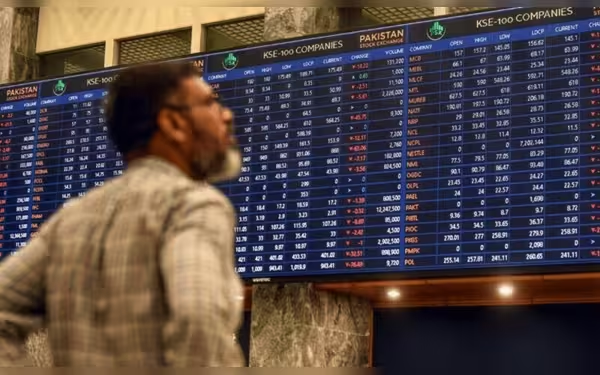Saturday, November 16, 2024 07:32 PM
KSE-100 Index Declines Amid Late Session Selling
- KSE-100 Index closes down 216 points at 85,453.22.
- HUBC and LPL terminate contracts, impacting market sentiment.
- World Bank projects 2.8% GDP growth for Pakistan in FY25.
 Image Credits: brecorder
Image Credits: brecorderKSE-100 Index falls by 216 points as HUBC and LPL terminate contracts, while World Bank forecasts 2.8% GDP growth for Pakistan in FY25.
The Pakistan Stock Exchange (PSX) has recently witnessed fluctuations in its benchmark KSE-100 Index, which closed lower by 216 points on Thursday. This decline, amounting to 0.25%, brought the index to a closing value of 85,453.22. Throughout the trading day, the index experienced a tug-of-war between buyers and sellers, ultimately resulting in late-session selling that tipped the scales in favor of the bears.
According to Topline Securities, a brokerage house, the market sentiment was notably influenced by two Independent Power Producers (IPPs), namely HUBC and LPL. Both companies announced their decision to terminate contracts early, which sent ripples through the market. Furthermore, HUBC revealed that it had reached an agreement with the Government of Pakistan and the Central Power Purchasing Agency-Guarantee to settle outstanding receivables up to October 1, 2024. This development is significant as it marks a step towards addressing the challenges faced by Pakistan's power sector.
In a related move, the Federal Cabinet approved the termination of existing Power Purchase Agreements with five IPPs, as recommended by the Task Force on Power Sector Reforms. Hub Power Company Limited (HUBCO), recognized as Pakistan's largest IPP, confirmed that it had initialed a negotiated settlement agreement with the government. This decision is expected to pave the way for much-needed reforms in the ailing power sector.
On the international front, Saudi Arabia's Minister for Investment, Sheikh Khalid Bin Abdul Aziz Al Faleh, announced that Manara Minerals would soon sign a deal with Barrick Gold and Pakistan's State-Owned Enterprises (SOEs). This announcement came during the minister's three-day official visit to Pakistan, where he also engaged in discussions with Pakistan's Chief of Army Staff, General Asim Munir, focusing on enhancing bilateral cooperation across various sectors.
Amid these developments, the World Bank has projected a positive outlook for Pakistan's economy, estimating a real GDP growth of 2.8% in FY25, an increase from the previous estimate of 2.3%. This optimistic forecast was detailed in the World Bank's report titled 'Pakistan Development Update: The Dynamics of Power Sector Distribution Reforms'.
Globally, Asian stocks received a boost from Chinese markets, as the People's Bank of China initiated a funding scheme aimed at revitalizing capital markets. This move contributed to a rise in Chinese stocks, with the blue-chip CSI300 index climbing 1.7% in early trading. Meanwhile, the Pakistani rupee experienced a slight depreciation of 0.02% against the US dollar, settling at 277.79 in the inter-bank market.
Trading volume on the all-share index decreased to 503.75 million shares, down from 596.05 million the previous day. The total value of shares traded also fell to Rs27.91 billion from Rs31.34 billion. PTCL emerged as the volume leader with 52.24 million shares traded, followed by Hub Power Co.XD and PIA Holding Company.
The recent fluctuations in the KSE-100 Index reflect the ongoing challenges and opportunities within Pakistan's economic landscape. As the government takes steps to reform the power sector and international partnerships strengthen, investors and stakeholders will be keenly observing how these developments unfold. The interplay between local and global markets will continue to shape the investment climate in Pakistan, making it essential for market participants to stay informed and agile in their strategies.













